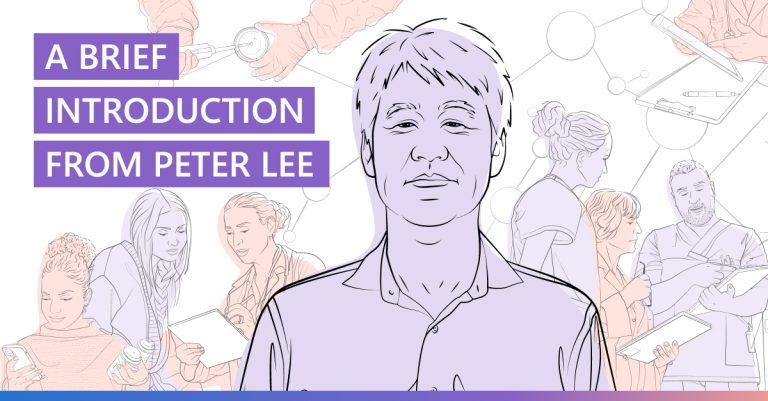Transcript
[MUSIC]
PETER LEE: This is The AI Revolution in Medicine, Revisited. I’m Peter Lee, president of Microsoft Research, and I’m pretty excited to introduce this series of conversations as part of the Microsoft Research Podcast.
About two years ago, with Carey Goldberg and Zak Kohane, we wrote a book, The AI Revolution in Medicine. This was a book that was intended to educate the world of healthcare and the world of medical research about this new thing that was emerging. This idea of generative AI. And we wrote the book in secret. In fact, the whole existence of what we now know of as OpenAI’s GPT-4 AI model hadn’t been publicly disclosed or revealed to the world. And so when we were working on this book, we had to make some guesses. What is this going to mean for healthcare? If you’re a doctor or a nurse, in what ways will AI impact your work? If you’re a patient, in what ways could AI change your experience as you try to navigate a complex healthcare system?
And so now it’s been about two years. Two years hence, what did we get right? What did we get wrong? What things have come along much faster than we ever would have dreamed of? What did we miss? And what things have turned out to be much harder than we ever could have realized? And so this series of conversations is going to talk to people in the real world. We’ll delve into exactly what’s happening in the clinic, the patient experience, how people are thinking about safety and regulatory matters, and what this all means for discovery and advancements of medical science. And even then, we’ll have guests that will allow us to look into the future—the AI advances that are happening now and what is going to happen next.
[MUSIC TRANSITIONS TO SERIES THEME]
[MUSIC FADES]
So now, let me just take a step back here to talk about this book project. And I’d like to just read the first couple of sentences in Chapter 1, and Chapter 1 is entitled “First Contact.” And it starts with a quote. Quote, “I think that Zak and his mother deserve better than that,” unquote. “I was being scolded. And while I’ve been scolded plenty in my life, for the first time it wasn’t a person scolding me; it was an artificial intelligence system.” So that’s how we started this book, and I wanted to read that because, at least for me, it takes me back to the kind of awe and wonderment in those early days when in secret development, we had access from OpenAI to what we now know of as GPT-4.
And what was that quote about? Well, after getting access to GPT-4, I became very interested in what this might mean for healthcare. But I, not being a doctor, knew I needed help. So I had reached out to a good colleague of mine who is a doctor, a pediatric endocrinologist, and head of the bioinformatics department at Harvard Medical School, Dr. Isaac “Zak” Kohane. And I sought his help. And in our back-and-forth discussions, one of the things that Zak shared with me was an article that he wrote for a magazine where he talked about his use of machine learning in the care of his 90-year-old mother, his 90-year-old mother, who—like many 90-year-old people—was having some health issues.
And this article was very interesting. It really went into some detail about not only the machine learning technology that Zak had created in order to help manage his mother’s health but also the kind of emotional burden of doing this and in what ways technology was helping Zak cope with that. And so as I read that article, it touched me because at that time, I was struggling in a very similar way with my own father, who was at that time 89 years old and was also suffering from some very significant health issues. And, like Zak, I was feeling some pangs of guilt because my father was living in Southern California; I was way up in the Pacific Northwest, you know, just feeling guilty not being there, present for him, through his struggles. And reading that article a thought that occurred to me was, I wonder if in the future, AI could pretend to be me so that my father could always have a version of me to talk to. And I also had the thought in the other direction. Could AI someday capture enough of my father so that when and if he passes, I always have some memory of my father that I could interact with? A strange and bizarre thought, I admit, but a natural one, I think, for any human being that’s encountering this amazing AI technology for the first time. And so I ran an experiment. I used GPT-4 to read Zak’s article and then posed the question to GPT-4, “Based on this article, could you pretend to be Zak? I’ll pretend to be Zak’s mother, and let’s test whether it’s possible to have a mother-son conversation.”
To my surprise, GPT-4’s response at that time was to scold me, basically saying that this is wrong; that this has a lot of dangers and risks. You know, what if Zak’s mother really needs the real Zak. And in those early days of this encounter with AI, that was incredibly startling. It just really forces you to reexamine yourself, and it kicked off our writing in the book as really not only being about a technology that could help lead to better diagnoses, help reduce medical errors, reduce the amount of paperwork and clerical burden that doctors go through, could help demystify and help patients navigate a healthcare system, but it could actually be a technology that forces people to reexamine their relationships and reexamine what it really means for people to take care of other people.
And since then, of course, I’ve come to learn that many people have had similar experiences in their first encounters with AI. And in fact, I’ve come to think of this as, somewhat tongue in cheek, the nine stages of AI grief. And they actually relate to what we’ll try to address in this new series of conversations.
For me, the first time that Greg Brockman and Sam Altman presented what we now know of as OpenAI’s GPT-4 to me, they made some claims about what it could do. And my first reaction was one of skepticism, and it seemed that the claims that were being made just couldn’t be true. Then that, kind of, passed into, I would say, a period of annoyance because I started to see my colleagues here in Microsoft Research start to show some amazement about the technology. I actually was annoyed because I felt they were being duped by this technology. So that’s the second phase. And then, the third phase was concern and maybe even a little bit of frustration because it became clear that, as a company here at Microsoft, we were on the verge of making a big bet on this new technology. And that was concerning to me because of my fundamental skepticism. But then I got my hands on the technology myself. And that enters into a fourth stage, of amazement. You start to encounter things that just are fundamentally amazing. This leads to a period of intensity because I immediately surmised that, wow, this could really change everything and in very few areas other than healthcare would be more important areas of change. And that is stage five, a period of serious intensity where you’re just losing sleep and working so hard to try to imagine what this all could mean. Running as many experiments as you can; trying to lean on as much real expertise as possible. You then lead from there into a period of what I call chagrin because as amazing as the technology is, actually understanding how to harness it in real life is not easy. You finally get into this stage of what I would call enlightenment. [MUSIC] And I won’t claim to be enlightened. But it is, sort of, a combination of acceptance that we are in a new world today, that things are happening for real, and that there’s, sort of, no turning back. And at that point, I think we can really get down to work. And so as we think about really the ultimate purpose of this series of conversations that we’re about to have, it’s really to help people get to that stage of enlightenment, to really, kind of, roll up our sleeves, to sit down and think through all of the best knowledge and experience that we’ve gathered over the last two years, and chart the future of this AI revolution in medicine.
[MUSIC TRANSITIONS TO SERIES THEME]
Let’s get going.
[MUSIC FADES]



